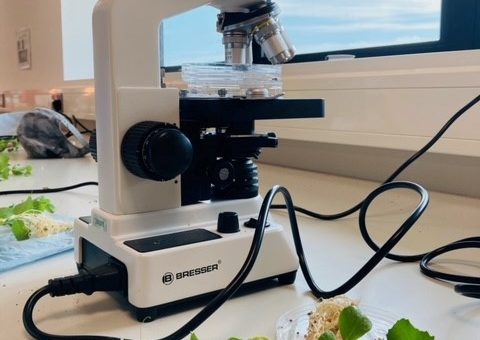Working with the Bawburgh Primary School

We strive to communicate the value, importance and impact of our research to the public in an accessible and interesting way.
Our experimental farm, in the village of Bawbugh, Norfolk, provides an excellent opportunity to build links with the local primary school children to engage them with the science that is happening on their doorstep.
The research on the farm includes looking into improving the nutrition of the crops that we eat and finding crops with improved resistance to pests and diseases. In response to the global challenge of a warming climate there is experimentation into growing crops with less inputs to reduce the carbon footprint of agriculture and research into identifying crop varieties with resilience to climate change.
The field station provides an inspiring state of the art environment for our researchers to do their work.
School Visit to Church Farm
In June 2022, thirty-one 7- to 9-year-olds from Bawburgh Primary School visited Church Farm. Their teacher Mr Johnston had prepared the pupils well, and soon they had identified the crops growing in the fields.
The students walked to the field station via the wildflower meadow, looking out for bees and butterflies. At the field station, the field experiment team showed some of the machinery used on the farm. They shared facts including how many gears the tractor has, and how the combine harvests the grain.
Then in the laboratory, the students were shown how some plants ‘fix’ nitrogen, and that this means the plants do not need to be given extra fertiliser. They had their own pea plant, washing the roots to reveal the pinkish nodules where the nitrogen from the air is converted to a form that the plant can use. The group then looked at the nodules and inspected the roots of their plant, and anything else they could find, under the microscope.
The students headed outside to see a demonstration of the drones used to collect data on the experimental and trial plots. The launch of the largest drone is quite spectacular and was greeted with screams of excitement. At one point a pair of Red Kites joined in the aerial show.
Before walking back to school, a Norwich University of the Arts Illustration student, Paris, showed them the results of her collaboration with JIC to produce illustrations about ‘high iron wheat’.
Paris had produced a cartoon explaining how iron is important in our diet, and how the wheat trialled at Church Farm could help people to be healthier. The pupils asked lots of questions about both science and art, and they were delighted to be able to take home some of her artwork to colour in.
The pupils were engaged, enthusiastic and a credit to their school, and we look forward to making this an annual event so that all pupils who attend Bawburgh Primary School will have a chance to visit Church farm and the field station.
School Pollination Project
Each year we plan to connect the school with a scientist working at the JIC. This coming school year Kelsey Byers and Mikhaela Neequaye have volunteered to explore pollination with the pupils.
They will use the wildflower meadow at the school to explore the diversity of plants and insects at different time points in the school year and head into the classroom for some pollination linked activities.
Kelsey is a member of the Primary Science Teachers Trust and features as a ‘scientist like me’, you can view a short video aimed at primary school children explaining Kelsey’s research.
School Allotment Project
The Bawbury Primary school has four allotment style growing areas that are shaded by tall trees and prone to being very dry, and because of this they are not being used.
Thanks to a new project in collaboration with Gressenhall, these allotments will be brought back to life as part of a pilot scheme, with Bawburgh Primary and three other local schools.
The scheme will create forest gardens that will be self-sustaining, require minimal maintenance, and provide plant-based food production systems based on a woodland ecology. Nut trees, fruit bushes, herbs and perennial vegetables can all be grown in this system.
This project is a collaboration between Ben Earle, Learning and Engagement Officer at the Gressenhall Farm and Workhouse Museum. He will be working with expert horticulturalist Nik Thomson, Dr Shannon Woodhouse, FFDT (Food, Farming Discovery Trust) and Dr Jenni Rant from the SAW Trust (Science, Art and Writing).
The children will design their forest gardens, and then propagate, plant and harvest the plants in their school. The project will also set up a school herbarium. The aim is for the student to become more aware of their environment, to develop new skills as they work together to co-create more sustainable, biodiverse spaces, that also yield healthy food.
